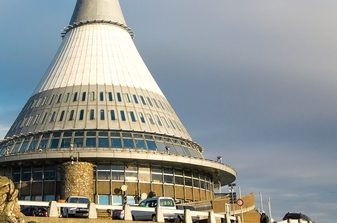Programme of the LEF 2023
Tuesday 5th and Wednesday 6th, September, 2023
We have 4 parallel sections you can participate in.
First day of LEF 2023
– Tuesday 5
th
(September, 2023)
The conference takes places at the Building G of the Technical University of Liberec, Univerzitní nám. 1410/1, 461 17 Liberec.
13.00 – Registration
14.00–14.10 – Conference Opening
doc. Ing. Aleš Kocourek, Ph.D. (Dean of the Faculty of Economics, TUL)
14.10–15.30 – Plenary session
Univ.-Prof. Dipl.-Ing. Dr.mont. Rupert Baumgartner
Helena Horská – Raiffeisenbank a.s.
15.30 – Coffee Break
16.00–18.00 – Discussion table 2023 RULES OF SURVIVAL
- Helena Horská – Raiffeisenbank a.s.
- Filip Gröschl – DPDHL
- Zdenka Studená – Flexjobs Consulting
- Radko Dražil – družstvo TEXman
- Miroslav Opa – Cegelec a.s.
- Mgr. Tomáš Vašák – lektor, psycholog
-
Petr Dovolil
18.00 – Evening gala programme and networking





Second day of LEF 2023
– Wednesday 6
th
(September, 2023)
Section 1: Sustainable Innovation and Entrepreneurship
(Classroom number G305)
Section 2: Economic Policies for Sustainability and Resilience
(Classroom number G306)
Section 3: Finance, Accounting, International Trade for Global Sustainable Development
(Classroom number G303)
Section 4: Marketing and Sustainable Tourism
(Classroom number G304)
Colloquium
Section 1:
Sustainable Innovation and Entrepreneurship
This session was co-organized by the project TIAM (Trends and Innovative Approaches in Management) project number EEA-CZ-ICP-3-011 with financial contribution from Iceland, Liechtenstein and Norway under the EEA Grants 2014- 2021, Education Programme.
(Classroom number G305)
The schedule and length of presentations of individual papers will be adapted to the number of participants
Chair: prof. Ing. Miroslav Žižka, Ph.D.
9:00–9:10 Kateřina Hušková and Jakub Dyntar (Inventory control of products at the end of their lifecycle based on nonparametric methods)
9:10–9:20 Dana Egerová and Ludvík Eger (Human Resource Sustainability and Digital Transformation: Exploring the Role of Key Actors)
9:20–9:30 Patrik Fitala, Radovan Savov and Gabriela Waldhauserová (Pitfalls of strategy creation and selection after COVID-19)
9:30–9:40 Denisa Skrbková, Petra Rydvalová and Ondřej Linhart (Family business innovativeness: a tool for successful succession?)
9:40–9:50 Dagmar Grachová and Soňa Ferenčíková (Artifical intelligence in Business Centres: A case study of 3 Business Centres in Slovakia)
9:50–10:00 Radka MacGregor Pelikánová and Veronika Zavřelová (Values endorsed by top responsible large Czech companies – existent and inconsistent?)
10:00–10:10 Soňa Ferenčíková and Dagmar Grachová (Reverse knowledge transfer: examples of three Business Centers in Slovakia)
10:10–10:20 Pavla Vrabcová, Hana Urbancová and Zuzana Pacáková (Transparent Internal Communication from Below and Above as a Part of the Total Quality Management Philosophy in Czech Organisations)
10:20–10:30 Quang Van Tran and Jan Vejmělek (Modeling the excess return of ČEZ a.s. share)
10:30–10:40 COFFEE BREAK
10:40–10:50 Magdalena Zbránková and Eliška Valentová (Tools to Support Effective Communication, Conflict Prevention and Conflict Resolution in Family Businesses)
10:50–11:00 Jakub Andar and Jakub Dyntar (Efficient order picking in a warehouse with double demand seasonality)
11:00–11:10 Ladislav Klement, Miroslava Vinczeová and Vladimíra Klementová (What prevents businesses from carrying out eco-innovation activities? Empirical research on barriers in Slovak SMEs)
11:10–11:20 Tereza Michalová and Jakub Sieber (Challenges and Opportunities in Knowledge Management in the Concept of Industry 5.0)
11:20–11:30 David Neděla and Tomáš Tichý (Dual Focus on Systemic Risk in Portfolio Management)
11:30–11:40 Lukáš Klarner and Petr Řehoř (Change management is SMEs)
11:40–11:50 Natalie Pelloneová and Vladimíra Hovorková Valentová (Financial Health of Cluster Organisations: A Case Study from the Czech and Slovak IT Sector)
11:50–12:00 Kateřina Maršíková and Vasilii Ostin (Fostering Employee Sustainability: Competencies Formation for a Resilient Business Environment)
12:00–12:10 Bernhard Koczian, Alexander Wick and Katarina Gubiniova (Generation Z as Employees in Public Pharmacies in Germany – Difficulties for Public Health in the Area of Medication Supply due to the Absence of Young People)
12:10–12:20 Hana Travnickova and Kateřina Maršíková (Non Provision of Training and Sustainability: Small-Sized Companies in the EU Context)
12:20–12:30 Agata Buczak, Małgorzata Martynoga and Jacek Wychowanek (Barriers to the implementation of innovation and internationalization in micro-enterprises)
Section 2:
Economic Policies for Sustainability and Resilience
(Classroom number G306)
The schedule and length of presentations of individual papers will be adapted to the number of participants
Chair: Ing. Blanka Brandová, Ph.D.
9:00–9:10 Diana Bílková (Financial Potential of Czech Employees from the Perspective of Gender Statistics)
9:10–9:20 Bartosz Bartniczak (Implementation of the Affordable and clean Energy Sustainable Development Goals (SDG) in Visegrad Group (V4)
9:20–9:30 Jiří Kraft (Critical reflection on selected issues connected with economic terminology)
9:30–9:40 Iouri Kotorov, Jaroslav Demel, Petr Blaschke and Yuliya Krasylnykova (The Effect of the Covid-19 Pandemic on Economic Growth and R&D Spending in the EU Countries)
9:40–9:50 Artur Boháč and Hynek Böhm (The Turów Crisis: Economy vs Sustainability)
9:50–10:00 Miroslav Jurkovič (Circular Economy as a Determinant of Environmental Behavior and Engagement of Business Subjects in Slovakia)
10:00–10:10 Milos Maryska, Lea Nedomova and Petr Doucek (ICT professionals wages development – is the economy in resilence preriod?)
10:10–10:20 Michael Šášky (Impact of Artificial Intelligence on Employment in the Slovak Digital Information Communication Technology Sector)
10:20–10:30 Huong Lien Ho and Irena Benešová (Can fiscal policy improve income inequality in the Northern midlands and mountainous region in Vietnam?)
10:30–10:40 COFFEE BREAK
10:40–10:50 Veronika Zemanová (Circular economy implementation from the perspective of benefits and barriers)
10:50–11:00 Joanna Kurowska-Pysz and Janusz Pierzyna (Determinants of Development of Municipal Economic Activity Zones in Poland)
11:00–11:10 Mansur Eshov and Karina Benetti (Impact of Monetary Policy Sustainability Indicators on Economic Growth in Transition to Inflation Targeting)
11:10–11:20 Martin Januska and Jiri Pesik (Recommendations for strengthening the critical factors of utilizing the Public Procurement for Innovative solutions)
11:20–11:30 Martina Hedvicakova and Alena Pozdílková (Analysis of Key Macroeconomic Indicators and Their Relationship to Unemployment in the Czech Republic)
11:30–11:40 Jitka Špeciánová (The Impact of Educational Attainment on Gross Wages: A Comparative Analysis of the Public and Private Sectors in Czechia)
11:40–11:50 Matus Dzuro (Correlation Between GDP per Capita and Vehicle Sales in the Context of COVID-19 Pandemics)
11:50–12:00 Eva Kislingerova (The destiny of globalisation and the fate of climate protection)
Section 3:
Finance, Accounting, International Trade for Global Sustainable Development
(Classroom number G303)
The schedule and length of presentations of individual papers will be adapted to the number of participants.
Chair: Ing. Lenka Strýčková, Ph.D.
9:00–9:10 Tomáš Imrich Profant (China in Africa: A World-System Analysis)
9:10–9:20 Lubica Zubalova, Kristína Drieniková and Sára Smolková (Criminality vs. Development and International Trade, case of Latin America)
9:20–9:30 Kryštof Tichý (Non-fungible tokens and the threat of wash trading)
9:30–9:40 Elena Hošková and Iveta Zentková (The impact of import and export on the domestic trade of fruit in the SR)
9:40–9:50 Karina Benetti, Katarína Izáková and Dalia A. S. Khalil (Correlation of Indicators of Development in the Insurance Market in the Czech Republic, Slovak Republic and the EU Average)
9:50–10:00 Olga Malikova and João Bedra (The Clarity of Financial Reports in the Global Environment: a Comparative Study of Selected Issues in the Czech and Brazilian Accounting Systems)
10:00–10:10 Lenka Strýčková, Zdeněk Brabec and Michaela Matoušková (Relationship between Environmental, Social, and Governance Factors and Financial Performance in Central European Countries)
10:10–10:20 Lenka Strýčková (Perception and Identification of the General Public with Sustainable Finance Issues)
10:20–10:30 Katarzyna Zahrajová, Martina Kügerová, Michal Kozieł, Hana Štverková and Michaela Bučková (Options for measuring legal and financial literacy)
10:30–10:40 COFFEE BREAK
10:40–10:50 Marta Nosková, Petra Taušl Procházková and Kristýna Machová (Assessment of Non-financial Reports in the Context of Circular Economy: the Case of Czech Large Companies)
10:50–11:00 Pavlína Petrová (The Impact of Robotic Process Automation and Artificial Intelligence on Employees in the Accounting Profession)
11:00–11:10 Pavla Švermová and Maik Sander (ROSI and Tools for Monetizing Sustainability (ESG) Measures)
11:10–11:20 Alexander Krieger, Jürgen Lange and Heiko Hector (Knowledge management as a necessity for the digitalisation of processes among tax advisors – A survey of German tax firms 2022)
11:20–11:30 Ausrine Lakstutiene, Aidas Malakauskas, Milos Kopa, Kristina Sutiene and Audrius Kabasinskas (Pension Fund Investment into Sustainable Assets: A Critical Review of Reporting Frameworks in Lithuania)
11:30–11:40 Ivan Holúbek, Renata Skýpalová, Michal Ruschak and Radovan Savov (EU taxonomy in the context of environmental, social and governance (ESG) ratings)
11:40–11:50 Jan Mačí and Tomáš Krtička (Crowdfunding and Sustainability. UN SDG Goals versus Campaign Goals in Developing and Developed Countries)
11:50–12:00 Barbara Barilová (Investigating the perceived importance and motivation of the students of the EUBA Faculty of Commerce towards the Deposit Refund System)
12:00–12:10 Michaela Matoušková (Development of the office space prices on the Czech market)
Section 4:
Marketing and Sustainable Tourism
(Classroom number G304)
The schedule and length of presentations of individual papers will be adapted to the number of participants.
Chair: Ing. Lenka ČERVOVÁ,Ph.D.
9:00–9:15 Dita Hommerová and Marie Krylová (Fairtrade Town Certification in the Czech Republic)
9:15–9:30 Vojtěch Beran and Jaroslava Dědková (Knowledge of the regional brand in Liberec region)
9:30–9:45 Theventharan Batumalai (The influence of review richness and valence on the E-WOM trustworthiness)
9:45–10:00 Eva Čáslavová, Josef Voráček and Karel Gerža (Preferences of active sports students at Charles University within online shopping in response to the Covid-19 pandemic)
10:00–10:15 Lucia Malíčková (Plastic reduction as part of sustainable golf tourism in Slovakia)
10:15–10:30 Martin Petříček and Štěpán Chalupa (Sharing Economy in the Accommodation Services – Example of Prague During the Years 2017 – 2022)
10:30–10:45 COFFEE BREAK
10:45–11:00 Alexander Wick, Ľubomíra Strážovská and Bernhard Koczian (The influence of multi-channel advertising by the pharmacy on customers and identification of advertising perceptions by customers)
11:00–11:15 Karel Guth, Tereza Aišmannová and Irena Benešová (Application of VAR Model to Determine Sustainability of Short-Term Rental Accommodation)
11:15–11:30 Alena Pozdílková and Martin Pozdílek (Solving optimization tasks on the real estate market using multi-criteria decision-making)
11:30–11:45 Kateřina Postránecká and Filip Dvořáček (Effective creativity against banner blindness)
After sections:
Colloquium
(Classroom number G305)
Ph.D. students of the Faculty of Economics of the Technical University of Liberec
13:00–13:15 Trávníčková Hana (doc. Maršíková)
13:15–13:30 Matoušková Michaela (doc. Poláček)
13:30–13:45 Michal Ondřej (doc. Kocourek)
13:45–14:00 Ostin Vasilii (doc. Maršíková)
14:00–14:15 COFFEE BREAK
14:15–14:30 Petrová Pavlína (doc. Poláček)
14:30–14:45 Postránecká Kateřina (doc. Dědková)
14:45–15:00 Dvořáček Filip (doc. Dědková)
15:00–15:15 Pudil Jiří (doc. Antlová)
